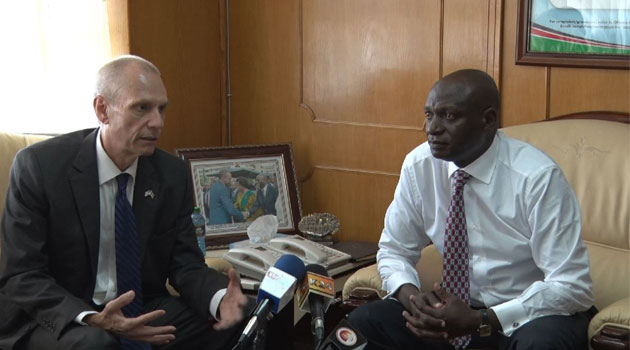
US Ambassador to Kenya Robert Godec who called on Energy Cabinet Secretary Charles Keter/KEVIN GITAU
The investment of US companies in the LAPPSET Project was among the things discussed when Godec called on Energy Cabinet Secretary Charles Keter last week.
At the meeting, Godec and Keter both recognised the need for public-partnership in the financing of Kenya’s development goals.
In the area of renewable power generation for example, Godec said, “Kenya needs probably USD14-18 billion worth of financing.”
Through President Barack Obama’s Power Africa initiative, Kenya and the US are already collaborating in the area of electricity generation.
READ: Obama’s Africa power project to sit in Nairobi
Kenya is among six African countries benefiting from a 2013-15 Sh604,099,766,213 American investment in Power Africa.
The Kinangop Wind Park, for example, is among the projects Power Africa is partnering with the Kenyan government and private investors.
“Kenya really is far along in terms of the enabling environment for private sector investment. Aeolus just reached financial close, that’s the largest private wind park in all of Sub-Saharan Africa and that’s a huge accomplishment for Kenya,” Power Africa Coordinator Andrew Herscowitz told Capital FM Business.
In Ethiopia, Power Africa is involved in the Corbetti Geothermal project that it projected to produce 1,000 megawatts of power and in Tanzania, Power Africa is involved in the Kiwira River Hydro Project.
The other two countries in the first phase of Power Africa are Liberia and Ghana.
Power Africa has also partnered with the World Bank and the African Development Bank in the effort to connect 20 million homes and businesses in Africa to the power grid.
READ: WB commits $5bn to lighting up Sub-Saharan Africa
On May 27, 2015 President Uhuru Kenyatta announced that the cost of connection to the electricity grid would drop to Sh15,000 from Sh35,000.
It is was the second time the Jubilee administration lowered the cost of connecting to the power grid, having first done so when it came into office in 2013 by subsidising the Sh70,000 cost.
When announcing the further reduction, President Kenyatta explained that it was the fruit of his government’s effort, over the two years they’ve been in office so far, to build the nation’s electricity production capacity.
“Standing here I am truly able to declare that by 2017, seventy percent of our country will have access to power, we shall surely be like the West in that regard,” he said at the launch of the Last Mile Connectivity Project in Machakos.
The African Development Bank (AfDB) and World Bank funded Last Mile Connectivity Project is part of the Jubilee administration’s effort to see three million more Kenyans connected to the power grid in the next three years.
“From 1922 to 2012, that is 90 years, 1.1 million customers connected. 2013 to 2015, three million customers which are connected,” Energy Principal Secretary Engineer Joseph Njoroge said of the progress made so far at the launch.
The AfDB partnership will see 5,320 transformers distributed to all the constituencies in Kenya making it possible for 314,200 customers to be connected to the low-voltage network.
The World Bank partnership will see a further 300,000 customers connected to both low and medium voltage power systems.
The Jubilee Administration has often presented the argument that a low cost, easily accessible and reliable electricity connection is critical to its efforts to power Kenya’s industrialisation.
It is also critical to its manifesto pledge of putting every school in Kenya in a position to take advantage of technological advancements.
READ: All primary schools to get power by June 2015
The Sh15,000 it now costs to connect to the power grid, President Kenyatta also made clear, can be paid out in instalments once the connection is made.
“Those who cannot afford even this new tariff, we have instructed that Kenya Power will allow that new tariff of Sh15,000 to be paid in instalments but connection will be done,” he assured.
EDITOR’s NOTE: This is an updated version of the earlier story.


































